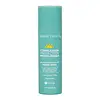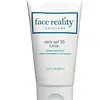What's inside
What's inside
 Key Ingredients
Key Ingredients

 Benefits
Benefits

 Concerns
Concerns

 Ingredients Side-by-side
Ingredients Side-by-side

Benzophenone-3 6%
UV AbsorberButyl Methoxydibenzoylmethane 1%
UV AbsorberEthylhexyl Methoxycinnamate 7.5%
UV AbsorberEthylhexyl Salicylate 5%
UV AbsorberWater
Skin ConditioningCaprylic/Capric Triglyceride
MaskingCorn Starch Modified
AbsorbentCetearyl Olivate
Diethylhexyl 2,6-Naphthalate
EmollientC12-15 Alkyl Benzoate
AntimicrobialSorbitan Olivate
EmulsifyingGluconolactone
Skin ConditioningSqualane
EmollientGlycerin
HumectantCyclopentasiloxane
EmollientTocopheryl Acetate
AntioxidantSodium Hyaluronate
HumectantXanthan Gum
EmulsifyingCarbomer
Emulsion StabilisingAminomethyl Propanol
BufferingSodium Benzoate
MaskingPhenethyl Alcohol
MaskingCaprylyl Glycol
EmollientPhenoxyethanol
PreservativeTrisodium Ethylenediamine Disuccinate
Potassium Sorbate
PreservativeBenzophenone-3 6%, Butyl Methoxydibenzoylmethane 1%, Ethylhexyl Methoxycinnamate 7.5%, Ethylhexyl Salicylate 5%, Water, Caprylic/Capric Triglyceride, Corn Starch Modified, Cetearyl Olivate, Diethylhexyl 2,6-Naphthalate, C12-15 Alkyl Benzoate, Sorbitan Olivate, Gluconolactone, Squalane, Glycerin, Cyclopentasiloxane, Tocopheryl Acetate, Sodium Hyaluronate, Xanthan Gum, Carbomer, Aminomethyl Propanol, Sodium Benzoate, Phenethyl Alcohol, Caprylyl Glycol, Phenoxyethanol, Trisodium Ethylenediamine Disuccinate, Potassium Sorbate
Ethylhexyl Salicylate 4.75%
UV AbsorberBenzophenone-3 4.25%
UV AbsorberButyl Methoxydibenzoylmethane 3%
UV AbsorberOctocrylene 2.8%
UV AbsorberAcrylates/C12-22 Alkyl Methacrylate Copolymer
Aleurites Moluccanus Seed Oil
Skin ConditioningAllantoin
Skin ConditioningButyloctyl Salicylate
Skin ConditioningBenzoic Acid
MaskingC12-15 Alkyl Benzoate
AntimicrobialCamellia Sinensis Leaf Extract
AntimicrobialCetearyl Alcohol
EmollientCyclopentasiloxane
EmollientDimethicone
EmollientEthylhexylglycerin
Skin ConditioningGlycereth-2 Cocoate
EmulsifyingGlycerin
HumectantHelianthus Annuus Seed Oil
EmollientMacadamia Ternifolia Seed Oil
EmollientMagnesium Aluminum Silicate
AbsorbentPhenoxyethanol
PreservativePolyacrylate Crosspolymer-6
Emulsion StabilisingPotassium Cetyl Phosphate
EmulsifyingTetrasodium EDTA
Tocopheryl Acetate
AntioxidantTocopherol
AntioxidantWater
Skin ConditioningEthylhexyl Salicylate 4.75%, Benzophenone-3 4.25%, Butyl Methoxydibenzoylmethane 3%, Octocrylene 2.8%, Acrylates/C12-22 Alkyl Methacrylate Copolymer, Aleurites Moluccanus Seed Oil, Allantoin, Butyloctyl Salicylate, Benzoic Acid, C12-15 Alkyl Benzoate, Camellia Sinensis Leaf Extract, Cetearyl Alcohol, Cyclopentasiloxane, Dimethicone, Ethylhexylglycerin, Glycereth-2 Cocoate, Glycerin, Helianthus Annuus Seed Oil, Macadamia Ternifolia Seed Oil, Magnesium Aluminum Silicate, Phenoxyethanol, Polyacrylate Crosspolymer-6, Potassium Cetyl Phosphate, Tetrasodium EDTA, Tocopheryl Acetate, Tocopherol, Water
 Reviews
Reviews

Ingredients Explained
These ingredients are found in both products.
Ingredients higher up in an ingredient list are typically present in a larger amount.
You probably know this ingredient as Oxybenzone, a sunscreen ingredient. It is a broad-spectrum sunscreen ingredient, meaning it can protect the skin against UVB and short UVA rays. The absorption range is 270-350 nm with peak absorption at 288 and 350 nm.
This chemical ingredient protects your skin by using chemical reactions to convert UV rays into heat and energy. UV absorbers may absorb both UVA and UVB rays. It is often combined with other sunscreen ingredients to help with stability.
Ongoing research is looking into whether oxybenzone causes skin irritation and sensitivity. However, it has been shown to trigger contact dermatitis in some studies.
Oxybenzone is allowed in certain concentrations by many countries. It is allowed up to 6% in the US, and Canada, 5% in Japan, and 10% in Australia. Other countries and regions of the US have banned this ingredient to protect coral reefs and marine ecosystems. These places include Hawaii, Key West, US Virgin Islands, marine parks in Thailand, Aruba, and Palau.
The EU currently allows the following maximum concentrations:
Studies show conflicting results about oxybenzone being absorbed into the human body. The Swedish Research Institute has advised careful use of this ingredient by pregnant women and children. We always recommend speaking with a professional if you have concerns about this ingredient and your health.
Learn more about Benzophenone-3Also known as Avobenzone, this ingredient is a chemical sunscreen filter that provides protection in the UV-A range.
Avobenzone is globally approved and is the most commonly used UV-A filter in the world.
Studies have found that avobenzone becomes ineffective when exposed to UV light (it is not photostable; meaning that it breaks down in sunlight). Because of this, formulations that include avobenzone will usually contain stabilizers such as octocrylene.
However, some modern formulations (looking at you, EU!) are able to stabilize avobenzone by coating the molecules.
Avobenzone does not protect against the UV-B range, so it's important to check that the sunscreen you're using contains other UV filters that do!
The highest concentration of avobenzone permitted is 3% in the US, and 5% in the EU.
Learn more about Butyl MethoxydibenzoylmethaneC12-15 Alkyl Benzoate is made up of Benzoic Acid and long chain alcohols. It has a low molecular weight.
C12-15 Alkyl Benzoate is an emollient and texture enhancer. Due to its solubility, it is often used in sunscreens to help evenly distribute active ingredients.
As an emollient, C12-15 Alkyl Benzoate helps soften and hydrate your skin. Emollients create a film on your skin that traps moisture within.
This ingredient has been reported to cause eye irritation.
Learn more about C12-15 Alkyl BenzoateCyclopentasiloxane, or D5, is a silicone used to improve texture of products and trap moisture.
D5 is considered lightweight and volatile. Volatile means it evaporates quickly after application. Once evaporated, D5 leaves a thin barrier that helps keep skin hydrated.
It is also an emollient. Emollients help soften the skin and prevent water loss. Silicones create a silky texture in products. D5 helps other ingredients become more spreadable.
Studies show D5 is safe to use in skincare products. We recommend speaking with a skincare professional if you have concerns.
Learn more about CyclopentasiloxaneEthylhexyl Salicylate is an organic compound used to block UV rays. It primarily absorbs UVB rays but offers a small amount of UVA protection as well.
Commonly found in sunscreens, Ethylhexyl Salicylate is created from salicylic acid and 2-ethylhexanol. You might know salicylic acid as the effective acne fighter ingredient and BHA.
The ethylhexanol in this ingredient is a fatty alcohol and helps hydrate your skin, similar to oils. It is an emollient, which means it traps moisture into the skin.
According to manufacturers, Ethylhexyl Salicylate absorbs UV wavelength of 295-315 nm, with a peak absorption at 307-310 nm. UVA rays are linked to long term skin damage, such as hyperpigmentation. UVB rays emit more energy and are capable of damaging our DNA. UVB rays cause sunburn.
Learn more about Ethylhexyl SalicylateGlycerin is already naturally found in your skin. It helps moisturize and protect your skin.
A study from 2016 found glycerin to be more effective as a humectant than AHAs and hyaluronic acid.
As a humectant, it helps the skin stay hydrated by pulling moisture to your skin. The low molecular weight of glycerin allows it to pull moisture into the deeper layers of your skin.
Hydrated skin improves your skin barrier; Your skin barrier helps protect against irritants and bacteria.
Glycerin has also been found to have antimicrobial and antiviral properties. Due to these properties, glycerin is often used in wound and burn treatments.
In cosmetics, glycerin is usually derived from plants such as soybean or palm. However, it can also be sourced from animals, such as tallow or animal fat.
This ingredient is organic, colorless, odorless, and non-toxic.
Glycerin is the name for this ingredient in American English. British English uses Glycerol/Glycerine.
Learn more about GlycerinPhenoxyethanol is a preservative that has germicide, antimicrobial, and aromatic properties. Studies show that phenoxyethanol can prevent microbial growth. By itself, it has a scent that is similar to that of a rose.
It's often used in formulations along with Caprylyl Glycol to preserve the shelf life of products.
Tocopheryl Acetate is AKA Vitamin E. It is an antioxidant and protects your skin from free radicals. Free radicals damage the skin by breaking down collagen.
One study found using Tocopheryl Acetate with Vitamin C decreased the number of sunburned cells.
Tocopheryl Acetate is commonly found in both skincare and dietary supplements.
Learn more about Tocopheryl AcetateWater. It's the most common cosmetic ingredient of all. You'll usually see it at the top of ingredient lists, meaning that it makes up the largest part of the product.
So why is it so popular? Water most often acts as a solvent - this means that it helps dissolve other ingredients into the formulation.
You'll also recognize water as that liquid we all need to stay alive. If you see this, drink a glass of water. Stay hydrated!
Learn more about Water